May 25, 2025 | 21:45 GMT +7
May 25, 2025 | 21:45 GMT +7
Hotline: 0913.378.918
May 25, 2025 | 21:45 GMT +7
Hotline: 0913.378.918
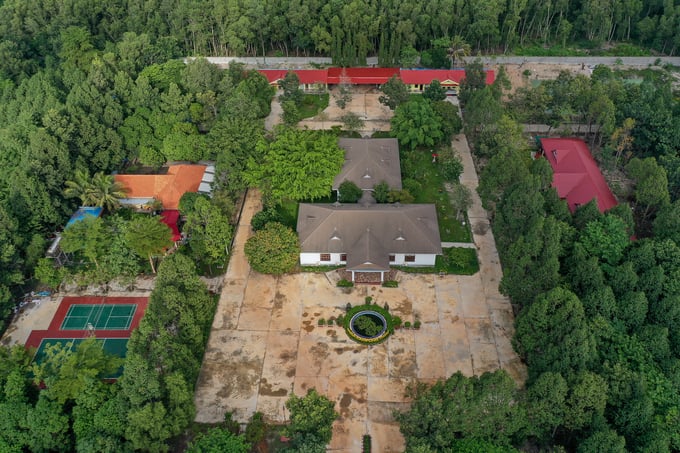
The headquarters, clean and beautiful like a resort, located within the rubber plantation of Ba Ria Kampong Thom Rubber Joint Stock Company. Photo: Tung Dinh.
With the permit granted at the end of 2006, a preliminary team visited Kroyéa Commune, Santuk District, Kampong Thom Province in 2007 to select the site. However, it was not until 2009 that the initial team of 8 Vietnamese officials was sent to lay the foundation for the establishment of Ba Ria Kampong Thom Rubber Joint Stock Company.
Fifteen years later, the company's headquarters resembles a resort, complete with landscaped grounds, ornamental plants, quality accommodation, and sports facilities. While enjoying a morning coffee at the company’s "hexagonal pavilion", General Director Hoang Huu Tuan shared: "From the initial survey, the Vietnamese officials recognized that this area, with its sandy soil and low topography, was very suitable for rubber cultivation".
However, the downside of the low topography is flooding, Mr. Tuan said. The first rubber trees planted by the company even floated up due to the flooding. Additionally, difficulties in recruiting and training labor also weigh on Ba Ria Kampong Thom, just as with all other VRG units in Cambodia.
Yet they have overcome all these challenges and developed so stably that now local workers do not want to go anywhere else. Cambodian workers choose to stay, live and grow, making Ba Ria Kampong Thom their second homeland.
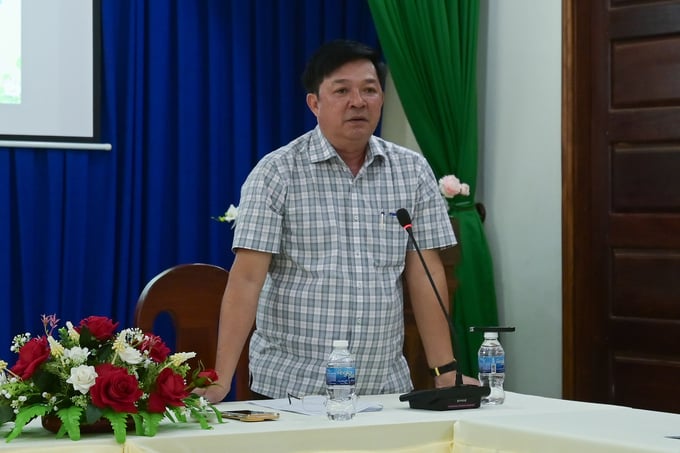
General Director Hoang Huu Tuan discussed the company's development process after 15 years in Cambodia. Photo: Tung Dinh.
This is the inevitable result of the company's leadership’s concern for its workers. For many years, management has consistently cared for, engaged with, listened to and shared the thoughts and wishes of the employees.
In addition to material support, the spiritual well-being of the Cambodian community is also a priority. Besides the shared temple built with Phuoc Hoa Kampong Thom and Tan Bien Kampong Thom, Ba Ria Kampong Thom has also mobilized resources to build its own temple. The company currently has 150 million riel allocated for renovating and expanding this temple.
"The habit of Cambodians is to take a day off immediately after receiving their salary. Initially, the company tried to find ways to change this practice, but after recognizing that it was a custom among the workers, we implemented a more effective solution", Mr. Tuan said about retaining employees.
Instead of prohibiting workers from taking a day off, the company accepts this practice and even organizes markets and services for them on their salary day off. To ensure productivity, this day off is compensated for by adjusting the work schedule in the following period.
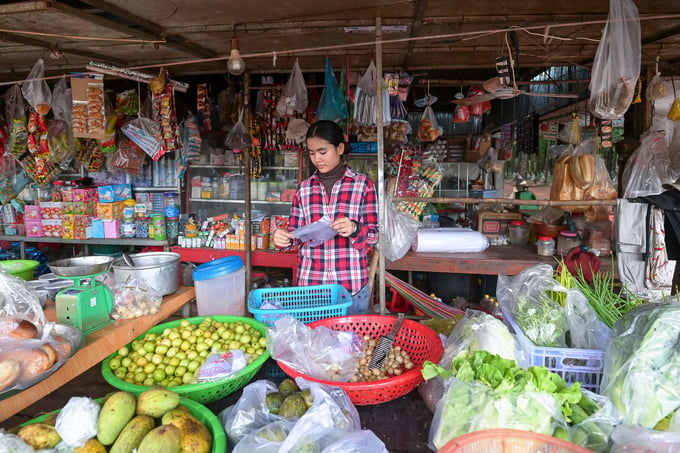
The Cambodian community lives, grows and remains closely connected with the company. Photo: Tung Dinh.
In addition to wages and earnings based on labor, the company also provides each worker with 15 kg of rice/month along with some other necessities. Regarding accommodation, the 500 housing units with 1.000 rooms constructed by the company are now fully occupied, divided into 4 residential clusters around the operational areas for the convenience of workers.
Achieving an average income of 300 USD/person/month since 2019, the living conditions of Ba Ria Kampong Thom Rubber workers have been increasingly stable and improving. "Among the company's workers, 25 families have already bought cars and almost every household has a motorcycle", the General Director added.
The children of the workers are provided with education at schools built by the company, with daily transportation provided. Additionally, the company offers extra monthly support to the 7 teachers assigned by the Cambodian government, beyond their state salary.
Since its investment activities in the Kingdom of Cambodia, Ba Ria Kampong Thom Rubber Joint Stock Company has consistently prioritized the well-being of its workers, effectively implementing social welfare policies. The living standards of the workers have gradually improved, contributing to a new and positive transformation in the local community surrounding the company’s operations. This commitment has been highly appreciated by the workers, local residents and the local government.
The total area of Ba Ria Kampong Thom Rubber in Cambodia is over 5.900 hectares, with 5.393,65 hectares dedicated to rubber plantations. The planting was completed in 2013 and production began in 2016. Since then, productivity and output have remained stable and have grown. From 2018 to the present, the company has consistently been a member of the 2-ton/ha club for six consecutive years.
This is also the first among the 16 VRG companies in Cambodia to return capital to Vietnam. Not only did it achieve this early, but Ba Ria Kampong Thom Rubber has already repaid over 60% of its initial investment, amounting to over 28.5 million USD. It is expected that within just over a year, the company will complete the full repayment of the initial investment to the group.
The challenges faced in the early stages have all been addressed and resolved. Thanks to effective care measures, the company's rubber plantations have grown well and developed uniformly, setting a solid foundation for future harvesting activities.
To address the issue of flooding, more than 600 kilometers of ditches and canals have been excavated and embanked around the rubber plantations, facilitating drainage for over 5.000 hectares. This system also helps ensure fire protection and prevention and water supply during dry seasons for the rubber forest.
Cambodians who have come to Ba Ria Kampong Thom Rubber have remarked that the success of the rubber here is due to good management, effective techniques and high quality. From the outset, 13 standard rubber varieties from the VRG Rubber Research Institute are planted and cared for according to technical specifications, with efficient use of fertilizers.
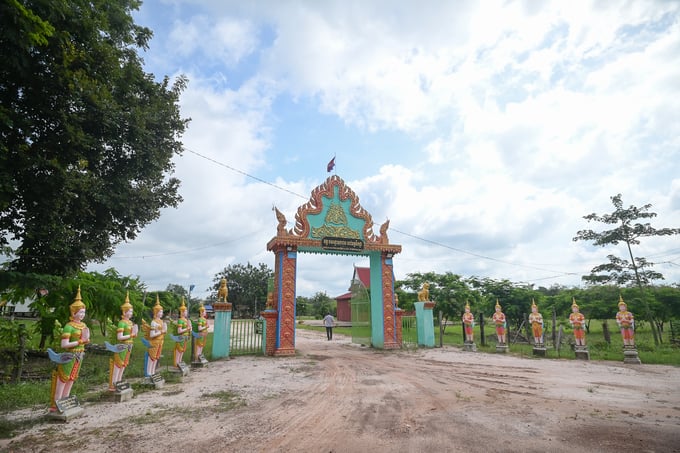
The temple built by the company serves the spiritual needs of Cambodian employees. Photo: Tung Dinh.
In addition, the cool climate and sandy soil, which are well-suited for rubber trees, ensure that both the yield and quality of the latex here are consistently among the best. Specifically, the planting density of rubber trees is 550 trees/ha, and at harvest time, it reaches up to 512 trees/ha.
Besides the quality of the trees, the management of workers is also effectively implemented, contributing to increased labor productivity. Currently, 4/10 leaders in the harvesting teams are Cambodian. These officials serve as a bridge to effectively convey the company’s techniques and policies to the workers.
In addition, the company has implemented a contracting system to motivate and increase labor productivity among workers. During periods when the rubber trees shed their leaves and latex collection is not possible, which typically lasts for about two months, the company provides alternative jobs for workers, such as cleaning and maintaining the plantations. This approach helps to sustain employment, ensure continued income and retain the workforce.
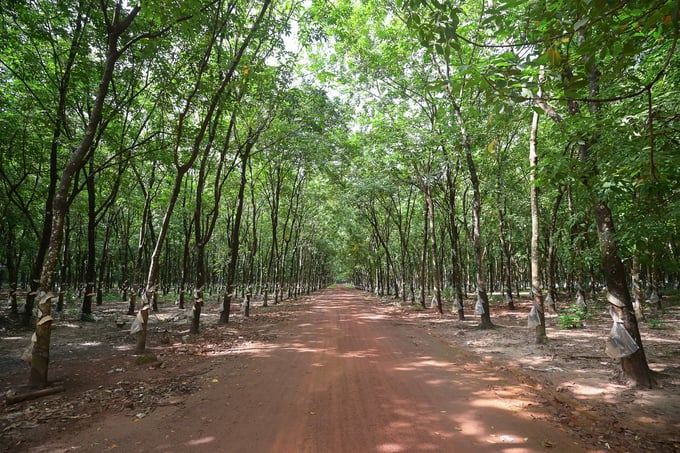
The high-quality rubber plantation of Ba Ria Kampong Thom. Photo: Tung Dinh.
For the past 15 years, Ba Ria Kampong Thom Rubber has consistently prioritized strengthening relationships with local government authorities and residents to ensure security and social order, as well as to protect the results of its production activities.
The company has proactively developed relationships with local government officials, established on-site security forces, and collaborated with local police, village police, and military forces. This cooperation ensures timely support and has maintained a stable security situation in the company's area of operation.
Translated by Phuong Linh
/2025/05/25/4127-3-073637_820.jpg)
(VAN) Thanks to the promotion from an FAO-implemented project, vegetable production in greenhouses in Moc Chau has seen strong development, from 1.5 hectares in 2021 to nearly 50 hectares in 2024.

(VAN) FAO has recently supported USD 140,000 to implement the project 'Risk mitigation human-animal interface risks through disease control initiatives in pig farming.'

(VAN) The People's Committee of Tra Vinh province has approved an adjustment to the investment policy for the Green Hydrogen Plant project, increasing its area to approximately 52.76 hectares.
![Reducing emissions from rice fields: [2] Farmers’ commitment to the soil](https://t.ex-cdn.com/nongnghiepmoitruong.vn/608w/files/news/2025/05/05/dsc08881jpg-nongnghiep-140632.jpg)
(VAN) Clean rice cultivation model in Thuong Tan commune, Bac Tan Uyen district, is assisting local residents in achieving sustainable agriculture by substantially reducing costs, increasing productivity, and protecting the environment.

(VAN) At the conference to disseminate Resolution No. 68, AgriS introduced its digital agricultural ecosystem and reaffirmed its commitment to accompanying the Government in promoting private sector development and sustainable agriculture.

(VAN) 'Blue Ocean - Blue Foods' initiative is designed to restore marine ecosystems and establish sustainable livelihoods for local communities by cultivating a minimum of 1,000 hectares of cottonii seaweed in the first three years.
/2025/05/21/4642-3-112707_603.jpg)
(VAN) The V-SCOPE project has made direct contributions to three out of six pillars of the Comprehensive Strategic Partnership between Vietnam and Australia.